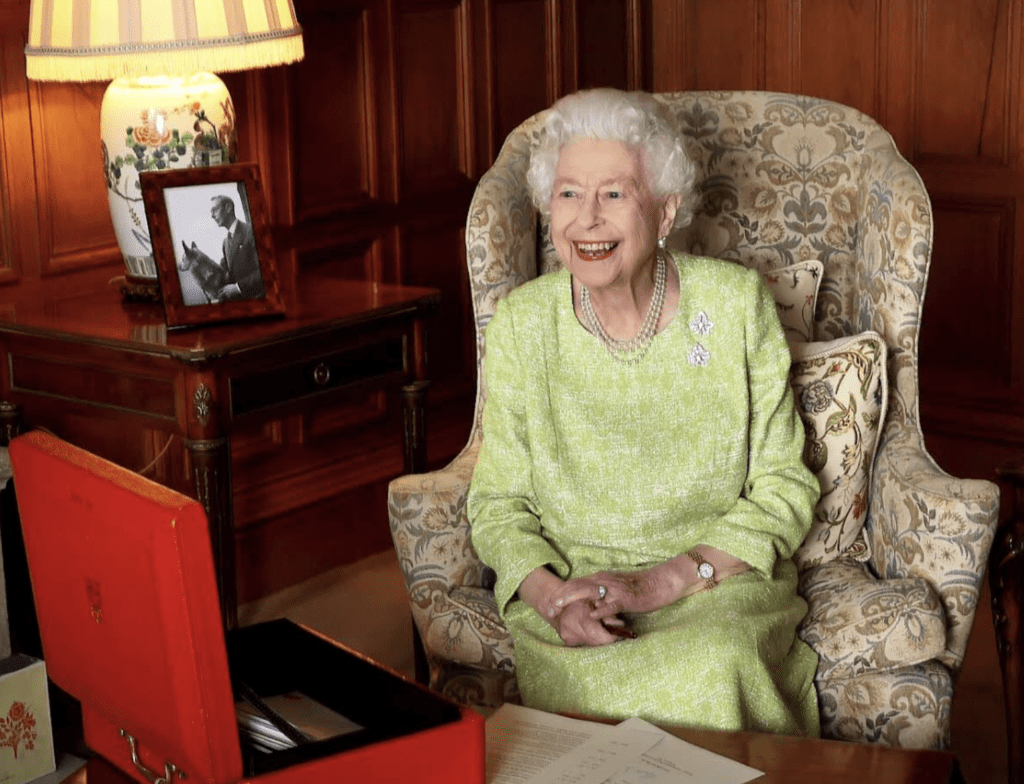Character as Leadership: 70 Years of Elizabeth II
 Platinum jubilee photo/Royal Family Twitter
Platinum jubilee photo/Royal Family Twitter
Lisa Van Dusen
February 6, 2022
We live in a moment defined by “moments”. This moment in time, this hinge of history as the crisis stage of the post-connectivity revolution is so made up of instantly shared, viral moments that the overinflated value of “moments” as narrative catalysts has created a parallel reality populated by propaganda actors seemingly bent on revenge against truth, democracy and, in some bouts of unbridled scenery chewing, sanity.
You don’t have to look far — or long at your screen — in 2022 to find examples of bad behaviour when power is so often measured by collective cognitive bandwidth purchased in disruption and belligerence.
Amid the latest chaos, we paused Sunday to acknowledge a woman who has been a world leader for 70 years — a record obviously owing to her status as an unelected monarch, but also to something so many leadership theories seem designed to compensate for.
Queen Elizabeth II has managed the inherent contradictions of her simultaneous roles as figurehead, wife, mother and manager of a family firm through seven decades of thick and thin, dramas and melodramas, crises, celebrations and scandals with a combination of seemingly ageless perspective and calm so yogic that it’s unimaginable to think of her yelling, even at her most provocative progeny.
She has presented to her constituencies of the United Kingdom and the Commonwealth, and to her global audience, a persona so consistent that Forbes ran a piece last May headlined The Queen Is the Biggest Celebrity Brand in The World. Here’s How to Stay Relevant in 2021 explaining why a 95-year-old woman had achieved “brand immunity” rivalled only by Coke and a cultural currency beyond the most revered rock stars and recognized reality-show divas.
This has been achieved by a woman who’d likely scoff at the notion that she has a persona, and who’d be equally dismissive of the idea that brand immunity is an achievement. Which goes to the source of both her longevity and her brand: character.
British monarchs throughout history have been felled early — and kings and queens elsewhere have accelerated their demise — by its absence. Elizabeth enables defenders of democracy to cite her as a major soft-power asset of a flagship of the liberal world order because the truth is, at just about any point in the past half-century, she’d have been elected in a landslide, which can now also be said of Prince Charles.
The two main character elements that have sustained the Queen’s popularity are the same ones whose want has doomed so many politicians in functioning democracies: trust and authenticity. The Queen may not always tell the whole truth, but she does tell the truth. The moment that best captures the connection between that element of her character and public trust was her “annus horribilis” speech of 1992, conceding on the 40th anniversary of her accession that the previous year of three failed royal marriages and Windsor Castle going up in flames had been no garden party.
Elizabeth enables defenders of democracy to cite her as a major soft-power asset of a flagship of the liberal world order because the truth is, at just about any point in the past half-century, she’d have been elected in a landslide
Her authenticity has been evident over 70 years of managing a constitutional role as seemingly irreconcilable as her other ones, maintaining her moral authority by maintaining her political neutrality while making her sympathies known on major questions from apartheid to Brexit. When she was authentic to a fault — as in the missed moment of hewing to protocol rather than sensing the outpouring of grief over Princess Diana’s death — she corrected. At a time when the most corrupt players in society can hide behind proxies to consolidate power, she’s had nowhere to hide since she was 25 — an inescapable function of the role that seems to have made her more, not less, conscious of the moral weight of her choices.
In a role whose combination of extraordinary privilege and lifetime gig could produce all manner of hyperentitlement, the Queen’s approach to “servant leadership” was articulated before it was an MBA class. “As we mark this anniversary, it gives me pleasure to renew to you the pledge I gave in 1947 that my life will always be devoted to your service,” she wrote in her Platinum Jubilee Accession Day message.
The Queen began her reign as a young woman navigating a world mostly of men exceptionally unable to indulge a reflex to dominate by either firing or harassing her — including her Buckingham Palace advisors, her own governments at Westminster and in Commonwealth Heads of Government Meetings — but who no doubt did not always make her life easy. She earned their respect as a strategist and visionary. That wisdom was also evident in her Accession Day message, which laid out her views on the future.
“And when, in the fullness of time, my son Charles becomes King, I know you will give him and his wife Camilla the same support that you have given me; and it is my sincere wish that, when that time comes, Camilla will be known as Queen Consort as she continues her own loyal service,” the Queen wrote.
Succession, not Succession. And right on brand.
Lisa Van Dusen is associate editor of Policy Magazine. She was Washington columnist for the Ottawa Citizen and Sun Media, international writer for Peter Jennings at ABC News, and an editor at AP National in New York and UPI in Washington.
